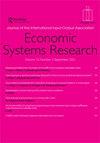核算全球移民汇款流量
IF 1.6
4区 经济学
Q2 ECONOMICS
引用次数: 3
摘要
摘要移民汇款对一些国家很重要。根据世界银行的数据,它们占吉尔吉斯斯坦、汤加、塔吉克斯坦、海地和尼泊尔GDP的30%以上。与官方发展援助或外国直接投资相比,汇款最近已成为欠发达国家的主要收入来源。在本文中,我们分析了移民母国产生的消费者需求的净溢出和反馈效应。我们使用世界银行对汇款的估计和世界投入产出数据库(WIOD)进行调查,并选择所谓的“假设插入”作为工具。我们发现,即使是一些发达国家,如美国,也可能从汇款中受益(全球最大的汇款途径是从美国到墨西哥),但并非所有国家都从中受益(例如加拿大没有)。我们没有提出强有力的政策建议。相反,我们建议更多地注意汇款估计的真实性。本文章由计算机程序翻译,如有差异,请以英文原文为准。
Accounting for global migrant remittances flows
ABSTRACT Migrant remittances are important to some countries. According to the World Bank, they comprise more than 30% of the GDP of Kyrgyzstan, Tonga, Tajikistan, Haiti and Nepal. Compared to official development aid or foreign direct investment, remittances have lately become a prime income stream for less-developed nations. In this paper, we analyze the net spillover and feedback effects from the consumer demand generated in migrants’ home countries. We use World Bank estimates of remittances and the World Input-Output Database (WIOD) for the investigation with so-called ‘hypothetical insertion’ as the tool of choice. We find that even some developed nations, like the US, likely benefit from remittances (the largest global path for remittances is that from the US to Mexico), but that not all do (e.g. Canada does not). We stop short of making strong policy recommendations. Instead, we suggest that more attention is paid to the veracity of remittance estimates.
求助全文
通过发布文献求助,成功后即可免费获取论文全文。
去求助
来源期刊

Economic Systems Research
ECONOMICS-
CiteScore
5.60
自引率
4.00%
发文量
17
期刊介绍:
Economic Systems Research is a double blind peer-reviewed scientific journal dedicated to the furtherance of theoretical and factual knowledge about economic systems, structures and processes, and their change through time and space, at the subnational, national and international level. The journal contains sensible, matter-of-fact tools and data for modelling, policy analysis, planning and decision making in large economic environments. It promotes understanding in economic thinking and between theoretical schools of East and West, North and South.
 求助内容:
求助内容: 应助结果提醒方式:
应助结果提醒方式:


